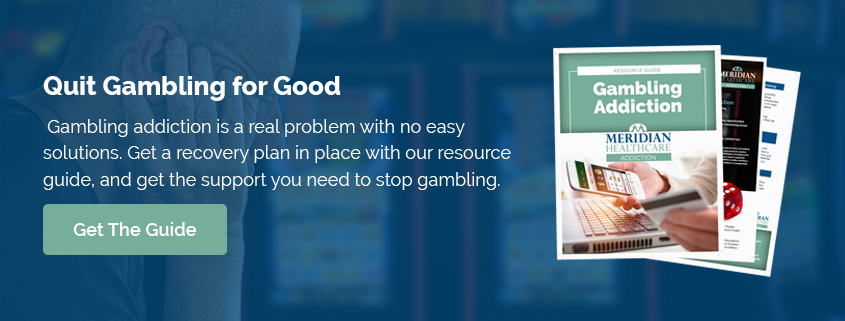When Do You Need Gambling Addiction Help? 7 Major Questions Answered
There’s nothing wrong with gambling every once in a while. It can be a fun, enjoyable activity when done responsibly. But, when this hobby begins to affect your overall mental health or causes you to regularly lose large amounts of money, it’s a problem.
Learn more about how to get gambling addiction help and recognize when enough is enough.
→ [Free Download] Do you often find yourself thinking about gambling or spend too much money gambling? Download our FREE Resource Guide to learn the signs of gambling addiction, and ways to treat it.
What Is Problem Gambling?
The National Council on Problem Gambling explains that gambling addiction is not just a financial problem; it’s a mental health problem that causes financial troubles. Gambling addiction is similar to substance use disorders in that a person has an uncontrollable compulsion to continue gambling, despite the negative consequences.
Gambling is a game of chance based on the results of a random event. The most common form is betting on the outcome of sporting events or lotteries. However, there are other types, such as slot machines and scratch cards, where the player has no control but instead must rely solely on luck.
What Is “Responsible Gambling”?
Millions of people gamble without developing a problem. About 85% of adults in America have gambled at least once throughout their lifetime (source: ncpgambling.org). There are a few ways to practice responsible gambling, as long as you still feel in control of your gambling. When it starts to feel like gambling is controlling you, it’s time to call a gambling addiction treatment provider.
How to Practice Responsible Gambling
-
- Set (and stick to) a dollar limit
- Keep gambling a social activity
- Never gamble with credit
- Stop gambling when you stop having fun
- Remember that you’ll most likely lose
- Set a time limit
- Know the risks
- Don’t chase your losses
- Only bet what you can afford to lose
How Do You Know When Gambling Becomes a Problem?
Some people think of gambling as harmless fun. But, when compulsive gambling interferes with finances, jobs, relationships, and other aspects of everyday life, it becomes a problem.
The diagnostic criteria for a gambling disorder, as described in the Diagnostic and Statistical Manual of Mental Disorders (DSM-5), includes persistent behaviors of the following:
-
- A need to gamble with increasing amounts of money for excitement
- Irritability when cutting down or no longer gambling
- Unsuccessful attempts to control gambling in the past
- Consistent thoughts about gambling
- Gambling to relieve stress
- Gambling more after losing a lot of money the day before (chasing losses)
- Hiding gambling behavior
- Actions are affecting work, education, or significant relationships
- Dependence on others for financial help due to their problem
How Does Problem Gambling Develop?
Experts have not yet determined the cause of gambling disorder. Factors seem to involve genetics, neurobiology, and psychology. The brain structures that are affected may include the amygdala, ventral striatum, and frontal cortex. As with any mental health condition, there are genetic predispositions to developing an addiction, whether that’s problem gambling or substance abuse.
Gambling addiction is not just a problem that affects the brain. The brain is involved in all behaviors, thoughts, emotions, and memories. The limbic system is responsible for all learned associations between stimuli and their associated responses, including the processing of emotions, such as fear or pleasure. The limbic system connects the euphoric feeling of winning with gambling, leading to the person wanting to gamble more to experience those feelings again.
Does Problem Gambling Look Different for Different People?
There is no age restriction for problem gamblers; it can affect anyone who gambles their money or property. However, different people can present with different gambling behaviors, which often co-occur with other behavioral health concerns like substance use disorders (SUDs). Here are some of the signs of gambling addiction in a loved one.
Young Adults
-
-
- Frequently boasts about gambling
- Unexplained loss of money or property
- Carries around a lot of cash
- Neglects school or work responsibilities
- Gambles late at night
- Argues with friends and family members about their gambling
-
Older Adults
-
-
- Gambles when their paycheck arrives
- Shows lack of interest in social activities
- Neglects credit card bills or home repairs
- Vague double-talk about gambling trips
- Secretive or late-night trips
- Poor hygiene or personal health
-
Everyone
-
-
- Constantly thinks about gambling or where to gamble next
- Gambles for stress relief
- Gambles to win lost money back
- Has repeated problems with family, friends, or work
- Borrows or steals money to gamble
- Loses a lot of money/continues to gamble when winning
- Mood swings from losing
- Visits casinos often
-
What Are Treatment Options for Gambling Addiction?
The first step to recovery is acknowledging that there is a problem. The next step is getting help. The good news is that a variety of professional treatment programs are available to those who want to stop gambling.
Gamblers Anonymous
Gamblers Anonymous (GA) is a free 12-step program for those struggling with gambling disorder and their families. Gam-anon meets in many cities around the country and can be found by contacting your local mental health and addiction treatment center. Compulsive gamblers have also found success through other 12-step programs like Alcoholics Anonymous (AA) when they have a co-occurring disorder or addiction.
Support Groups
Gambling addiction support groups bring together people with the same addiction to make participants feel less alone. Members provide support and advice to each other as they overcome the same struggles together.
Counseling/Therapy
Professional treatment for a gambling addiction commonly utilizes some form of therapy or counseling. Cognitive Behavioral Therapy (CBT) helps people recognize how their emotions affect their behaviors and actions — then helps them develop strategies for change. Treatment plans for gambling disorders focus on a harm reduction approach with relapse prevention, coping skills, and financial management.
Medication
As with any addiction, no medication will magically cure a gambling disorder. But, if a gambling addiction co-occurs with depression, ADHD, anxiety, bipolar disorder, or any other mental illness, medication can relieve those symptoms — which is especially important if impulse control is a problem.
Disclaimer: medication alone cannot cure a mental disorder and should be part of a treatment program.
Where Do You Go For Help?
The first step in overcoming a gambling addiction is acknowledging the problem. Unfortunately, there’s no self-help book on recovering from an addiction, but there’s nothing wrong with asking for help.
Meridian HealthCare is an addiction treatment facility that can help you or a loved one recover from an addiction, whether it’s gambling, alcohol, or substance abuse. Meridian offers inpatient services, outpatient treatments, counseling, and more (depending on the patient’s individualized treatment plan). If you or someone you know needs gambling addiction help, call today to schedule an appointment or make a referral.
If this is an emergency, call the problem gambling helpline at 800-589-9966.






